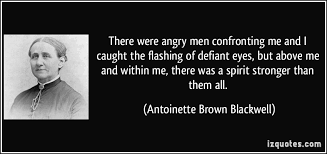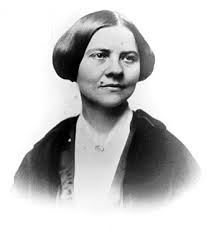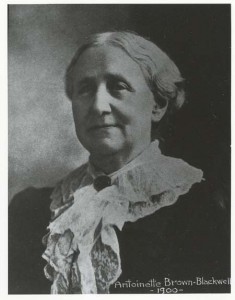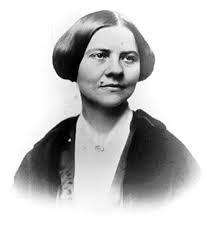 In a previous post this month we recounted the main events of the life of Antoinette Brown Blackwell. This week we will examine Antoinette’s thinking. Antoinette was a brilliant woman – a theologian and a philosopher, compassionate and intelligent, able to submit to authority yet also a leading orator in her day. Antoinette was a faithful and loving wife and mother.
In a previous post this month we recounted the main events of the life of Antoinette Brown Blackwell. This week we will examine Antoinette’s thinking. Antoinette was a brilliant woman – a theologian and a philosopher, compassionate and intelligent, able to submit to authority yet also a leading orator in her day. Antoinette was a faithful and loving wife and mother.
Theologian and Philosopher – First of all Antoinette was a religious woman. The Brown’s were Congregationalists. Antoinette had a pious grandmother who taught Antoinette and her siblings about God. She read the Bible and Pilgrim’s Progress. God’s love and mercy were emphasized in her family. Antoinette loved to walk in the nearby woods and commune with God.
When Antoinette was eight years old she joined the church. She decided she wanted to be a minister. Of course she was criticized. Girls were not supposed to dream of becoming ministers.
But Antoinette held on to this dream and pursued the study of theology at Oberlin College when she was in her early twenties. Though Oberlin espoused education for women, there were limits. They would not promote the ordination of women to preach. Antoinette would have to wait until 1878 to receive an honorary M.A. and until 1908 before being recognized by the college for her work with an honorary Doctor of Divinity.
When Antoinette graduated from Oberlin she was hoping to be able to preach in Congregational churches. After initially denying Antoinette a license to preach, they finally granted her one in 1851 but they would not ordain her.
Eventually in 1852 Antoinette received a call from a Congregational Church in South Butler, New York. Since the Congregationalist’s would not ordain her, she received ordination from a Methodist minister. Rev. Luther Lee preached the ordination sermon from the text, “There is neither male nor female; for you are all one in Christ Jesus” (Gal. 3:28). He stated, “…in our belief, our sister in Christ, Antoinette L. Brown, is one of the ministers of the New Covenant, authorized, qualified, and called of God to preach the gospel of His Son Jesus Christ.”
Antoinette was thus the first woman to be ordained in a Protestant denomination in the United States. Later she would officiate at a wedding becoming the first female minister to do so.
Luther Lee’s views were in the minority, and criticism from all sides would lead to some depression for Antoinette. Even members of her own congregation made life difficult for her. Though she longed to minister to people she knew she had to resign and did so in 1854 after serving for less than a year.
Antoinette went home to rest for a while. Then began the period on her life in which she began to work in the areas that she is known for to this day – abolition, temperance, and women’s rights.
Compassionate and Intelligent – Antoinette spent a year working in the slums and prisons of New York City. She had a compassion for the poor especially abandoned and destitute women and children.
Even while she was ministering at the South Butler church, Antoinette would receive invitations to lecture on woman’s rights, antislavery, and temperance. Antoinette helped found the Association for the Advancement of Women in 1873 to promote the general betterment of women. In the 1800’s there were few laws protecting women from abusive husbands. She spoke regularly at suffrage meetings at the state and national levels and was elected president of the New Jersey Woman Suffrage Association in 1891.
Antoinette helped to found the American Purity Association, which supported efforts to prevent state regulation of prostitution and to reform the social relations of the sexes. Then as now prostitution only benefits men while harming women. Regulation of prostitution only provides easy access to this sin for men. Antoinette and other Christian women fought to help the women to a better life.
Wife and Mother – Antoinette married Samuel Charles Blackwell in 1856. Theirs was a love match start to finish. Samuel was supportive of Antoinette’s activities. Antoinette took time off to raise her five daughters. She set aside lecturing and touring to be an attentive mother. Antoinette agreed that, “…the paramount social duties of women are household duties, avocations arising from their relations as wives and mothers, and as the natural custodians of the home. I make hast to endorse this dogma; fully, and without equivocation.” Yet she went on to advocate for women to integrate outside work with their household duties. If women did not reach out to care for the poor in their neighborhoods the world would be a sadder place.
For herself Antoinette decided that writing was something she could do from home. Samuel occasionally entertained the girls so their mother could get a couple of hours alone to write. This was her way of contributing something to society while being a good wife and mother.
Orator and Writer – Antoinette’s first book was published the same year as the birth of her last daughter. She went on to write and as the girls grew independent she returned to speaking and being active in social work.
Her first book – Studies in General Science, was a compilation of essays. In the late 1800’s philosophical discussions were part of everyday life even in the middle classes. Antoinette showed in her book that she had given much thought to philosophy. Educated philosophers of the day commended her book as intelligent and thoughtful. Her theory was that everything in the universe was moving towards harmony.
Other publications include: The Sexes throughout Nature (1875); In The Physical Basis of Immortality (1876) she further elaborated on what she viewed as scientific evidence of the “indivisible ‘mind-body’ “. In this book Antoinette wrestled with the question of the immortality of the soul concluding that souls are timeless. Her final works, The Philosophy of Individuality (1893), The Making of the Universe (1914), and The Social Side of Mind and Action (1915), further elaborated on these themes, underscoring the harmony of nature and individual actions. She also published a novel, The Island Neighbors (1871), and a book of poems, Sea Drift (1902).
Here are a few excerpts of her wisdom:
- Family – “The family is the basis of civilization. It is the unit of social
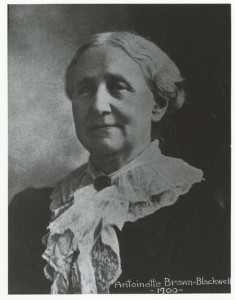 relations… The most fundamental of all human relations must be the most carefully safeguarded…”
relations… The most fundamental of all human relations must be the most carefully safeguarded…” - Harmony – Antoinette wanted all groups to work together to accomplish goals and lamented the fact that there were organizations that seemed to be competing with each other when they should have been working together. For example, the two leading suffrage movements worked apart harming both until finally in 1890 thanks to Antoinette’s mediating work they joined and made one organization.
- Politics – “My grandmother taught me to spin, but the men have relieved womankind from that task and as they have taken so many industrial burdens off our hands it is our duty to relieve them of some of their burdens of State.”
- Spiritual Issues – Antoinette believed that spiritual and political issues were interrelated. (I would agree today especially on the issue of abortion.)
- Worldview – “The more noble (man) is, the more he suffers from a sense of his own incapacities, and the boundless need of a Beneficent Helper… to Be assured that there is an Almighty Arm and a Sleepless Omniscient Eye, able to see all things and to reach everywhere, cannot fail to bring its own comfort!”
- Final Things – Antoinette’s mind remained clear and bright even to her 97th year when she quietly died in her sleep. She did not fear death but looked forward to meeting Sam and her predeceased children. “But after all it is only to me slipping through a door which opens to receive a new guest.”
Antoinette believed that women should undertake intellectual work and she did much to advance the opportunities for women to get education. Today we take it for granted that women can go to any educational institution that men do. We owe that to Antoinette Brown Blackwell and others like her.
Women need to stretch out and improve themselves. “Nothing is lacking but courage, perseverance, resolution applied… diligently.” Thank you for your courage, Antoinette Brown Blackwell.
